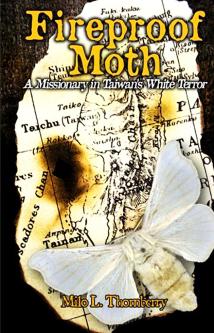I recently finished the compelling book  Fireproof Moth: A Missionary in Taiwan’s White Terror, by Milo Thornberry, who secretly helped democracy advocate Peng Ming-min escape Taiwan (and thus also possible assassination by the KMT) in the bad old days (being, in this case, early 1970). Soon thereafter, Thornberry and his wife, now Judith Thomas, became the first missionary couple to be deported from Taiwan since the Japanese era — though not for their assistance in the escape of Peng, which the authorities did not uncover. Neither did Washington or Beijing.
Fireproof Moth: A Missionary in Taiwan’s White Terror, by Milo Thornberry, who secretly helped democracy advocate Peng Ming-min escape Taiwan (and thus also possible assassination by the KMT) in the bad old days (being, in this case, early 1970). Soon thereafter, Thornberry and his wife, now Judith Thomas, became the first missionary couple to be deported from Taiwan since the Japanese era — though not for their assistance in the escape of Peng, which the authorities did not uncover. Neither did Washington or Beijing.
For that matter, even though the authorities had people assigned to watch Peng night and day, they did not know for weeks that he had slipped away. Here’s how Peng relates this:
My successful escape had stirred up a hornet’s nest. Senior government officers were certain that I could not be in Sweden because their records, the reports of their subordinates, showed that I had been traveling here and there in Formosa until the very day the news of my escape became known, almost three weeks after I left my house in Taipei. According to these reports, I had been staying in the best hotels, eating at expensive restaurants, and enjoying the cinema. The proof in their hands were the police bills charged against the special account for my surveillance.
Then the truth became evident. During the months in which I had so often secluded myself for long periods, and probably since I was released from prison in 1965, and during the weeks after I had left the island, my guards, the Investigation Bureau agents, and the police had been submitting falsified accounts, false expense vouchers and claims, and pocketing the money.
Of course that, delicious as it is, has nothing to do with the usual subjects of this blog. So here’s my excuse for bringing this up. In the following passage Thornberry describes the scene at the airport as he is awaiting deportation.
It took half an hour for four people to go through our few bags. They went through everything — jars of cold cream, tubes of toothpaste, and every piece of paper in my briefcase.
A difficulty arose when they found some sermons I had in my briefcase. Since they were written in Romanized Chinese, no one there could read them. They assumed they were some kind of secret code. So I spent several minutes with one of the men, reading the sermons to him and a couple of others who were looking on. I pointed to the words as I read. Finally, they decided that they were what I said they were and allowed me to put them back into my briefcase. I felt a certain irony as I preached to one of my guards in my last moments in Taiwan.
- Amazon link
- publisher’s page on Fireproof Moth
- Brief review, Taipei Times
- Time Traveler: Fireproof Moth, Radio Taiwan International, December 21, 2011 (click on the small buttons below “Time Traveler” to hear the audio)
- Time Traveler: A US Missionary in White Terror Taiwan, Radio Taiwan International, December 21, 2011 (click on the small buttons below “Time Traveler” to hear the audio)
- Time Traveler: Democracy activist Professor Peng Ming-min, Radio Taiwan International, January 4, 2012 (click on the small buttons below “Time Traveler” to hear the audio)

The question is, which system of Romanization did he use?
Wouldn’t it be funny if it were Gwoyeu Romatzyh?
Investigators will even sometimes call the subject to ask him where he
has been recently, in order to fill out their reports to superiors, if
they are too lazy to trail him all day (or he lives in the woods ;-)).
@Tom: There’s the story, perhaps apocryphal, of a British office in Hong Kong that sent its sensitive cables in Gwoyeu Romatzyh under the theory that Chinese people wouldn’t have any idea how to read them.